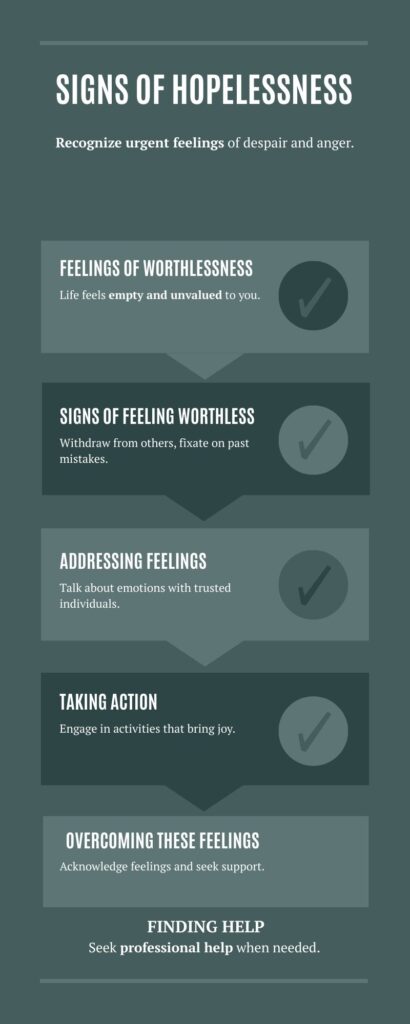Major depressive disorder affects about seven percent of U.S. adults, and nearly half of those also experience anxiety, yet many don’t receive help because depression often shows hidden signs that go unnoticed by themselves and others. High-functioning depression can mask symptoms like feelings of worthlessness—where individuals feel undeserving of love and may isolate themselves or overwork to hide their struggles—and hopelessness, which can manifest as anger, low sex drive, sleep and appetite issues, and withdrawal from enjoyable activities. These hidden signs are often disguised by excessive productivity or busy schedules, making it hard to recognize the underlying depression.
Hidden Signs of Depression
Major depressive disorder affects nearly seven percent of adults in the U.S.
What’s more, nearly half of those diagnosed with depression also suffer from co-occurring anxiety disorders.
Yet, many people don’t get the help they need, and in fact, those around them don’t realize that they are struggling with depression. Why is that?
Individuals can often deal with hidden signs of depression that they don’t recognize themselves or that others don’t recognize in them. This is especially true for people who have high-functioning depression.
What Are the Hidden Signs of Depression?
Symptoms of depression hinge on feelings of worthlessness and hopelessness.
Worthlessness
Those who struggle with worthlessness might not feel that their life has any value, and this causes them to pull away from people around them, usually thinking that they don’t deserve love. Sometimes, an individual can hide behind work obligations or other life changes to keep these signs of depression hidden from loved ones.
Worthlessness can also manifest as avoiding personal responsibilities or fixating on mistakes. These signs can often be hidden or explained away through behaviors like constant negative self-talk or self-criticism.
If, for example, you are struggling with concentration and you are feeling overwhelmed by worthlessness, you might isolate yourself from your friends by bringing home extra work, but that decision is an attempt to overcome your feelings of worthlessness by working more than everyone else.
Hopelessness
Those who struggle with hopelessness might deal with angry outbursts that don’t match the situation, limited sex drive, problems sleeping or eating, and a lack of participation in activities or hobbies that were once enjoyable.
These feelings of constant hopelessness might mean that you don’t recognize your depression and others don’t recognize it in you because you fill your emptiness by working too much or participating in constant volunteer activities, hoping that if you keep yourself busy, you can ignore or overcome the feelings.
This might come off as someone who’s very productive, has it together, or works harder than everyone else, but really, it’s an avoidance strategy to avoid sitting with feelings of hopelessness and depression.
FAQ
Can You Have Depression and Hide It?
There are many circumstances where an individual might be struggling with depression, but it isn’t as obvious to those around them. Sometimes, people struggle with what is called high-functioning depression. Someone who has high-functioning depression might not exhibit their symptoms in the same way, and they don’t let the depression impact work or school performance and relationships in the same way as traditional depression.
Nevertheless, even high-functioning or hidden depression should still be treated with proper mental health treatment.
Does Art Therapy Help Depression?
Rather than sit and talk about your emotions, art therapy lets you creatively express things like fears or anxiety. Case studies have found that art therapy can:
- Keep your attention focused on the present instead of the future or past
- Give you a positive outlet when you are dealing with a difficult time
- Improve social behavior and self-esteem
At our mental health treatment center, you can participate in a range of artistic activities, none of which require any previous experience or skill. With different types of art therapy, you can confront things like low self-esteem at a time when you are feeling poorly about yourself because of depression. When ruminating thoughts make you feel like things are out of your control and there is no point, you can put your creative energies into something that allows you to take back control of your daily life.
The right type of coloring books, clay-making classes, or even painting can be very enjoyable, keep your mind focused on the present, give you the tactile engagement that can release the tension you might be holding in your body, and give you a deeper connection to your feelings.
Can You Treat Depression with Yoga?
At Elevate Point, we offer yoga as one of our many holistic modalities for depression treatment. When most people think of yoga, they picture slim and toned men or women with tight clothing on a beach or against a sunset in a difficult pose, but in reality, yoga is an opportunity to bring your focus to the present instead of a cycle of anxiety and worry about the future.
The body can hold on to things like toxins from drug abuse, slow muscles because of inactivity, or even physical scars, but with yoga, you force your mind to let go of the past and stop worrying about the future.
During your outpatient program, you will experience discomfort like the discomfort of being in a new place surrounded by people you don’t know or the discomfort of cravings, fear of relapse, depression, or anxiety.
Yoga is a way to teach you to sit with this discomfort in a healthy and safe way rather than turning back to drugs or alcohol to avoid or repress the discomfort.
What Causes Hidden Depression?
Many things can cause depression, no matter how well you hide your symptoms. The most common cause of hidden depression is genetics, especially if you have a family member with a history of depression; this makes you three times more likely to develop it yourself. Exposure to trauma, if left untreated, can lead to depression, as can your environment, like extreme poverty during childhood, systemic discrimination, or substance abuse.
Certain types of depression can be caused by hormonal shifts like pregnancy, whereas others can be caused by changing seasons, prescription medication, or acute difficulties like the loss of a loved one.
No matter the cause, it’s important that you get help for depression treatment before things get worse. Call Elevate Point today.


